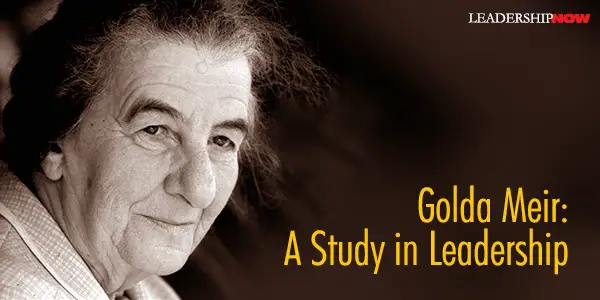 |
 |
05.19.08

Golda Meir: A Study in Leadership
I KNEW a man that had met with Golda Meir in 1971. He said that she was no ordinary woman. Yet, he said, paradoxically, that was because she was such an ordinary woman. He described her as "an exceptionally intelligent, capable, balanced, and understanding mind." He said she had that rare quality of seeing things precisely as they are. Her vision was in sharp focus. Her mind was capable of piercing through the extraneous and confusing details to the central important point. She remained unconfused by the labyrinth of branches and twigs and had the trunk of the tree in clear view. Golda Meir was indeed a remarkable woman. Golda by Elinor Burkett has been released to coincide with the start of Israel's 60th Independence Day celebrations this month. This well-balanced biography is an interesting story beginning with her family fleeing Russia, where she was born in 1898, to begin again in Milwaukee, Wisconsin. There she developed a passionate commitment to Zionism, married, and pushed for their eventual relocation to Palestine in 1921. She put the cause of Zionism above all else, sacrificing even her personal life.She worked tirelessly raising money and used her gifts of charm and oratory to promote the cause. Some of her personal characteristics – self-confidence, intransigence, myopic vision, doggedness – brought her much criticism later in life, but they were exactly what was called for at that time and place in the formation of a country. She certainly had her own way of doing things. Ben-Gurion once said, “She had faith when others wavered. She believed in the absolute justice of our cause when others doubted.”  Eventually, the aftermath of the 1973 Yom Kippur War brought her time to an end, and the embattled prime minister resigned in 1974. She died on December 8, 1978, at the age of 80. She was a great leader, and this is a great study in leadership – both the good and the bad – of an ordinary woman who became an extraordinary leader. In the end, Burkett writes: A woman of greater wisdom might have resigned and let the younger generation battle it out, no matter the cost. A leader of foresight might have told her people everything they didn’t want to hear, that the situation was not sustainable, that a dozen problems were woven into the national fabric, and that they were living on quicksand. A creative prime minister might have devised new approaches to everything from ethnic divisions to peacemaking. And an innovator might have burst the national bubble of arrogant self-confidence by explaining that the political system was ossified or acknowledging that Israelis were not, in fact, the new superheroes. 
Posted by Michael McKinney at 03:49 PM
|
BUILD YOUR KNOWLEDGE
 

How to Do Your Start-Up Right STRAIGHT TALK FOR START-UPS 
Grow Your Leadership Skills NEW AND UPCOMING LEADERSHIP BOOKS 
Leadership Minute BITE-SIZE CONCEPTS YOU CAN CHEW ON 
Classic Leadership Books BOOKS TO READ BEFORE YOU LEAD |